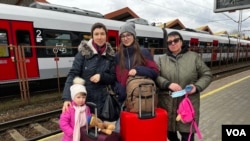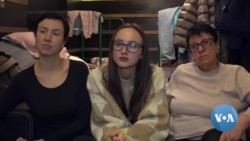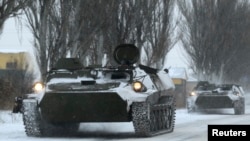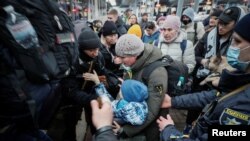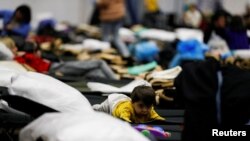For the first time in four long days, three-year-old Ulya Nochovna is sleeping soundly in a bed.
She has fled hundreds of kilometers through a war zone, from her home in Kyiv to Poland. Her family has been given beds in a refugee shelter in the town of Przemysł, a few kilometers from the frontier.
Three generations of the Nochovna family have been forced to flee their homes: three-year-old Ulya, her 18-year-old older sister Anna, their mother Maria and grandmother Tatiana. The four women left their home in the Ukrainian capital on March 2. The father, an army reservist, was called up to fight the Russian invasion.
Each of the two million Ukrainians who have fled the Russian invasion has a heart-breaking story of separation and loss. For the Nochovnas, the upheaval is traumatic yet familiar; it is the second time they have been forced from their homes.
Double refugees
In 2014, they fled their home in Luhansk, in eastern Ukraine, as Russian-backed separatists seized the city. They moved to the Ukrainian capital. Eight years on, they have been forced to leave everything behind again, as Russia’s tanks circle Kyiv.
“We are experiencing this whole nightmare for the second time,” said 40-year-old mother Maria Nochovna. “I didn’t think my family would have to go through this again. When we moved to Kyiv, we hoped that we were safe. We bought a house; our life was starting again. I was happy for the children. I even gave birth to my second child. And when I had to go through this for the second time, I couldn’t even believe that this could be happening in the 21st century,” she told VOA.
Russian missiles
18-year-old Anna Nochovna was an international business student at Kyiv University. Overnight, their lives were transformed as Russia’s invasion began. In near-fluent English, Anna explains that the family decided to flee as Russian missiles hit the surrounding streets.
“We were just sitting in the rooms and hearing all the sounds. We understand that we need to go somewhere to save our lives. I have a sister; she is three years old. And we understand that we need to make something for her future,” Anna said.
“This is really, really hard for my soul, because I love Ukraine and all Ukrainians. You know that we don’t want to share our country with Russia. We are not brothers like most people think.”
Escape from Kyiv
They packed suitcases and reached Kyiv station. Anna showed VOA the videos she recorded on her mobile phone: now familiar images of women and children of all ages crammed onto station platforms and stairwells, desperate to escape.
“Hundreds, thousands of people, Ukrainians, they’re staying in the railway station of Kyiv or other cities. It’s really hard because they are not sitting in the train, they are just on the stairs and they are begging, ‘Please we want to leave Kyiv because we don’t know what to do,’” Anna said.
It took them two days to reach the Polish border.
“It was really hard way because we stayed on the border for 24 hours. A lot of people were there. They don’t have any places to sit, they’re just standing. Imagine the situation, (my) seventy-year-old granny, she was just standing, and she didn’t have any place to sit.”
Anna’s grandmother Tatiana Novhovna has lived through Soviet rule and Ukrainian independence. Now, she’s been forced to flee her homeland.
“I can’t talk about this topic without tears,” Tatiana said. “I just start crying. I’m sorry for the children, for the country, for everyone. I don’t wish that anyone was in our shoes. There is no peace. We just want peace. Why do people live like this?”
Moving on
But as a refugee, there is little time yet for reflection on life’s injustices. The family is preparing to move on. On the internet, Anna has found a host family in the Polish city of Krakow willing to share their home.
“She will pick us up from the railway station in Krakow. I have written to her and she asked if we need some clothes, if we need some food,” Anna explained.
So, after two nights in the shelter, they are on the move again — a now familiar ritual of packing and preparation, fleeting yet heartfelt goodbyes to fellow travelers and those who have offered shelter.
Back at Przemysł railway station where they first arrived in Poland, they are given free tickets to reach Krakow. The family has a warm compartment to themselves. Ulya soon falls asleep as the train heads west across the flat plains, away from the border, through unfamiliar landscapes and cities.
Host family
Three hours later, the train pulls into Krakow station. Waiting on the platform is Christina Letkowski, the Nochovnas’ new host. She embraces each of them. The journey of escape, for now, is over.
Tens of thousands of Poles and other Europeans have opened their homes to Ukrainian refugees. Christina, a Spanish national whose husband, Konrad, is Polish, says it is a natural human reaction.
“We must help. I was checking all the time who is going across the border. It’s heart-breaking. And I had to help. I have a free room and I couldn’t say no,” she told VOA.
The Nochovnas say they are overwhelmed by the welcome they have received in Poland. And Ulya has a new friend: Carmen, the Letkowski’s two-year-old daughter. Within minutes of their arrival, the two children are playing together. Slowly, Ulya’s smile is returning; despite all she’s been through, the joy of childhood still burns bright.
Moving again
But there is another twist in the tail of the Nochovna’s story.
At the time of publication, the family are on the move again. A friend of Anna’s godmother has offered a bigger space for them in Budapest. They are back on the train, heading through Slovakia to Hungary, to another unknown city. And the Letkowski family is offering their spare room to other refugees.
For the Nochovnas, the journey is not yet finished. An escape from war to find hope a new life for a young child, aided by the kindness of strangers and the strength of one remarkable family.




